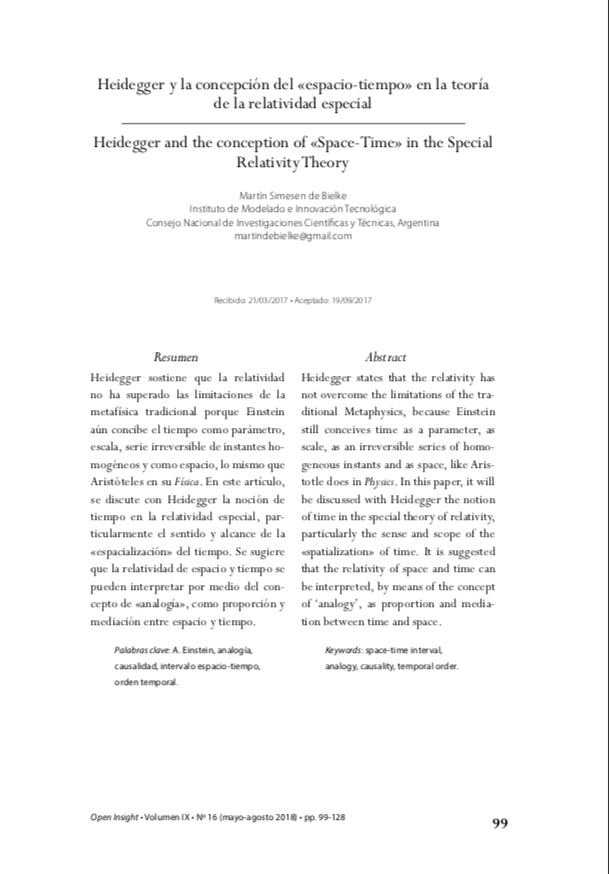Heidegger y la concepción del «espacio-tiempo» en la teoría de la relatividad especial
Resumen
Heidegger sostiene que la relatividad no ha superado las limitaciones de la metafísica tradicional porque Einstein aún concibe el tiempo como parámetro, escala, serie irreversible de instantes ho- mogéneos y como espacio, lo mismo que Aristóteles en su Física. En este artículo, se discute con Heidegger la noción de tiempo en la relatividad especial, par- ticularmente el sentido y alcance de la «espacialización» del tiempo. Se sugiere que la relatividad de espacio y tiempo se pueden interpretar por medio del con- cepto de «analogía», como proporción y mediación entre espacio y tiempo.Citas
Heidegger, M. (2009a). El concepto de tiempo en la ciencia histórica.Tiempo e historia. J.A. Escudero, trad. Madrid: Trotta.
Heidegger, M. (2009b). El trabajo de investigación de Wilhelm Dilthey y la actual lucha por una concepción histórica del mundo.Tiempo e historia. J.A. Escudero, trad. Madrid: Trotta.
Heidegger, M. (2013). Seminarios de Zollikon. A. Xolocotzi Yañez, trad. México: Her- der.
Howard, D., “Was Einstein really a realist?” Perspectives on science: historical, philosophical, social, vol. 1, 1993, p. 204–251.
Laue von-, M., “Zwei Einwände gegen die Relativitätstheorie und ihre Widerlegung”, Physikalische Zeitschrift, vol. 13, 1912, p118-120. https://archive.org/details/ZweiEinwaendeGegenDieRelativitaetstheorieUndIhreWiderlegung. Consul- tado el 15 de Marzo de 2017.
Minkowski, H. (1908). “Raum und Zeit”. En Jahresbericht der deutschen Mathe- matiker-Vereinigung, 18, p75-88. Disponible en: http://www.math.nyu. edu/~tschinke/papers/yuri/14minkowski/raum-und-zeit.pdf. [Última con- sulta: 30/09/2017].
Platón. (2007). Diálogos VI: Filebo, Timeo, Critias, Cartas. Madrid: Gredos.
Reichenbach, H. (1920). Relativitätstheorie und Erkenntnis a priori Berlin: Springer.
Reichenbach, H. (1924). “Axiomatik der relativistischen Raum-Zeit-Lehre”. Die Wis- senschaft, 72.
Reichenbach, H. (1928). Philosophie der Raum-Zeit-Lehre. Berlin: Springer.
Reichenbach, H. (1957). The Philosophy of Space & Time. Nueva York: Dover.
Reichenbach, H. (1965). The theory of relativity and a priori knowledge. Berkeley; Los Angeles: University of California Press.
Reichenbach, H. (1969). “Axiomatik der relativistischen Raum-Zeit-Lehre”. Die Wis- senschaft, 72. Axiomatization of the theory of relativity. Berkeley; Los Angeles: Uni- versity of California Press.
Reichenbach, H. (1979). Die philosophische Bedeutung der Relativitätstheorie. Bruns- chweig: Vieweg.
Sánchez Ron, J.M. (1983). El origen y desarrollo de la relatividad. Madrid: Alianza.
Schlick, M. (1917). Raum und Zeit in den gegenwärtigen Physik. Zur Einführung in das Verständnis der allgemeinen Relativitätstheorie. Berlin: Springer.
Schlick, M. (1920). Space and Time in Contemporary Physics: An Introduction to the Theory of Relativity and Gravitation. Londres y Nueva York: Oxford University Press.
Sklar, L. (1977). Space, Time and Spacetime. Berkeley: University of California Press.
Sklar, L., (1985). Philosophy and Spacetime Physics. Berkeley: University of California Press.
Smart, J.C. (1964). Problems of space and time. New York: Macmillan Publishing Com- pany, 1964.
Taylor, E.F.; J.A.Weehler. (2000). Exploring Black Holes: An Introduction to General Relatitvity, New York: Prentice Hall.
Tippler, P.; R. Llewellyn. (2008). Modern Physics New York: H. W Freeman and Com- pany.
Vigo, A. (2006). Estudios aristotélicos Navarra: Eunsa.





